|
|
|
Sort Order |
|
|
|
Items / Page
|
|
|
|
|
|
|
| Srl | Item |
| 1 |
ID:
117585
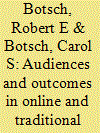

|
|
|
|
|
| Publication |
2012.
|
| Summary/Abstract |
In 1997 we first offered American government classes online as well as face-to-face classes. We administered pre- and posttests to our students to measure their general knowledge of American government, political attitudes, demographics, and some behaviors. Following an initial report in 2001, we continued to gather data for 10 more years; this current study covers nearly 3,200 students during 13 years. We examine the sample as a whole and changes in audiences and outcomes, over time, for the two teaching formats. Although the kinds of students taking online classes have become more similar, a few differences persist. Learning outcome differences continue to be insignificant. Neither format has a clear advantage in students' changes in attitudes, but the online classes increased students' newspaper reading. Class dropout rate and faculty workload both favor face-to-face classes, but flexibility in scheduling and student demand clearly favor online classes.
|
|
|
|
|
|
|
|
|
|
|
|
|
|
|
|
| 2 |
ID:
117583
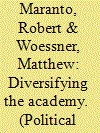

|
|
|
|
|
| Publication |
2012.
|
| Summary/Abstract |
Researchers have long recognized that higher education is dominated by professors whose politics are well to the left of the American political center. The cause and implications of this ideological imbalance have been intensely debated since the 1960s. Although critics of higher education, such as David Horowitz, argue that the political imbalance in academia is largely the result of ideological discrimination, emerging research on the views, values, and experiences of the professoriate tells a more complex story. Despite the relatively small numbers in the academy, the findings suggest that many conservative scholars can succeed in a predominantly liberal environment. Drawing on the latest research, as well as their own personal experience, the authors outline steps that conservative faculty can take to avoid needless political conflict and work happily in a profession largely dominated by the Left.
|
|
|
|
|
|
|
|
|
|
|
|
|
|
|
|
| 3 |
ID:
117582


|
|
|
|
|
| Publication |
2012.
|
| Summary/Abstract |
Large majorities in nearly every country support democracy, according to studies of cross-national surveys. But many of these reports have treated as missing data persons who did not provide a substantive response when asked to offer an opinion about the suitability of democracy as a regime type for their country, which has led to substantial overestimates of expressed support for democracy in some countries. This article discusses the consequences of excluding such nonsubstantive responses and offers suggestions to improve the study of popular support for democracy.
|
|
|
|
|
|
|
|
|
|
|
|
|
|
|
|
| 4 |
ID:
117578


|
|
|
|
|
| Publication |
2012.
|
| Summary/Abstract |
Government efforts to prevent corruption vary from reformulating laws and regulations to establishing control and oversight mechanisms such as integrated public management systems within central and local governments. However, several technical issues as well as social-political events may critically affect its effectiveness. This article addresses this issue by analyzing the Integrated Management System and Administrative Modernization (SIGMA for its acronym in Spanish) established in Bolivia through a World Bank US$15 million loan. Possible solutions and next steps to improve its effectiveness that can be applied to other countries are suggested.
|
|
|
|
|
|
|
|
|
|
|
|
|
|
|
|
| 5 |
ID:
117586


|
|
|
|
|
| Publication |
2012.
|
| Summary/Abstract |
Engaging students in the design, administration, and postelection analysis of an exit poll can be an excellent experiential learning activity. Lelieveldt and Rossen (2009) argue that exit polls are a "perfect teaching tool" because they provide students with a cooperative (rather than competitive) learning experience; help students better connect theory, methodology, and course substance; and allow students to move outside of the classroom by branching out into the community. As professors at the University of Colorado, Denver (UCD), we have organized student exit polling during the 2008 and 2010 elections in the Denver area for research methods and elections classes. Although we have found these exit polls to be rewarding experiences for instructors and students alike, the reality is that conducting an exit poll with a group of polling neophytes, in the confines of a single semester, can be challenging. In this article, we discuss strategies and issues for instructors to consider when using an exit poll as an experiential learning exercise.
|
|
|
|
|
|
|
|
|
|
|
|
|
|
|
|
| 6 |
ID:
117581
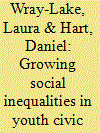

|
|
|
|
|
| Publication |
2012.
|
| Summary/Abstract |
Social class differences in civic engagement persist for both youth and adults. Although empirical evidence is mixed, several recent social changes pertaining to youth suggest that social inequalities in civic engagement may be growing over time for young people. Using data from the National Election Study, we compared trends for youth and older adults of varying education levels and tested the hypothesis of an increasing educational disparity in youth political participation. Results for voting supported our expectations: declines over time were found for less-educated youth only. Unexpectedly, participation in other political activities for more-educated youth declined more over time compared to other groups. Our findings highlight the need to create equal opportunities for youth civic engagement across social groups.
|
|
|
|
|
|
|
|
|
|
|
|
|
|
|
|
| 7 |
ID:
117577
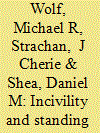

|
|
|
|
|
| Publication |
2012.
|
| Summary/Abstract |
Political observers have detected a noticeable uptick in American political incivility in recent years, culminating with several moderate senators recently citing the rise of hard-core partisanship as the reason for their retirement. Supporting these accusations of unprecedented incivility with empirical evidence can be difficult, as notions of what constitutes appropriate, civil behavior are subjective and can vary across the political context of different eras. Was it more uncivil, for example, for William Jennings Bryan to accuse his political opponents of crucifying other Americans on a cross of gold than it was for a member of Congress to yell "You lie!" at the president in the nation's Capitol? Assessing the incivility of these statements requires determining the effect each had on political opponents' abilities to maintain a functional relationship despite their disagreement over policy outcomes. Nevertheless, many politicians, political observers, and scholars are truly concerned that current levels of incivility are indeed worse, not only damaging the ability to resolve complex public problems, but threatening the long-term stability of America's governing institutions. Largely focusing on changes in institutional structures and elite behavior, scholars identify numerous explanations for this trend.
|
|
|
|
|
|
|
|
|
|
|
|
|
|
|
|
| 8 |
ID:
117580


|
|
|
|
|
| Publication |
2012.
|
| Summary/Abstract |
Recent polls reveal that between 20% and 25% of Americans erroneously indicate that President Obama is a Muslim. In this article, we compare individuals' explicit responses on a survey about religion and politics with reaction time data from an Implicit Association Test (IAT) to investigate whether individuals truly associate Obama with Islam or are motivated reasoners who simply express negativity about the president when given the opportunity. Our results suggest that predispositions such as ideology, partisanship, and race affect how citizens feel about Obama, which in turn motivates them to accept misinformation about the president. We also find that these implicit associations increase the probability of stating that Obama is likely a Muslim. Interestingly, political sophistication does not appear to inoculate citizens from exposure to misinformation, as they exhibit the same IAT effect as less knowledgeable individuals.
|
|
|
|
|
|
|
|
|
|
|
|
|
|
|
|
| 9 |
ID:
117573
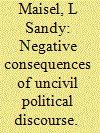

|
|
|
|
|
| Publication |
2012.
|
| Summary/Abstract |
Congressman Alan West (R-FL) passed the incivility duck test when he described his fellow Floridian Congresswoman Debbie Wasserman Schultz (D) as "the most vile, unprofessional and despicable member of the House of Representatives." That read like incivility, sounded like incivility, and was universally interpreted to be uncivil, thus it probably was.
|
|
|
|
|
|
|
|
|
|
|
|
|
|
|
|
| 10 |
ID:
117576


|
|
|
|
|
| Publication |
2012.
|
| Summary/Abstract |
Negative ads have become increasingly common in presidential campaigns. Figure 1 well illustrates this point (see also West 2009). The upcoming 2012 elections will almost surely augment this upward trend of more and more negativity. In fact, with the emergence of Super Pacs, the share of attack ads in 2012 will likely be significantly higher than in 2008, which in and of itself was the high-water mark for attack ads in the modern era. The harsh tone of the battle for the 2012 Republican presidential nomination certainly points toward an exceptionally nasty fall campaign.
|
|
|
|
|
|
|
|
|
|
|
|
|
|
|
|
| 11 |
ID:
117572
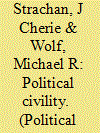

|
|
|
|
|
| Publication |
2012.
|
| Summary/Abstract |
The articles in this symposium are peppered with numerous recent incidents of political incivility ranging from physical scuffles at town hall meetings to the now-infamous accusation shouted at president Barack Obama during a nationally televised address before a joint session of Congress. Name calling and ad hominem attacks that were once associated with talk radio and cable television pundits have made their way into the halls of governing institutions, which no longer serve as sacred spaces one-step removed from bare-knuckled politics. Indeed, divisive views have even made inroads into "safe" topics for discussion-the weather and sports. Forget the intensity of debate over climate change. Democrats were actually 10% more likely to claim that the 2012 winter season was warmer than were their Republicans counterparts (Newport 2012). Sports no longer offers a neutral conversation starter, as 27% of Republicans view Tim Tebow as their favorite quarterback compared to only 9% of Democrats (Public Policy Polling 2011). Vitriol, combined with legislative gridlock and the uproar of protestors-not only in Washington, DC, but also in state capitals and prominent cities across the country-has shifted our discipline's attention to the role of political civility in sustaining a healthy democracy.
|
|
|
|
|
|
|
|
|
|
|
|
|
|
|
|
| 12 |
ID:
117584
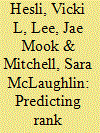

|
|
|
|
|
| Publication |
2012.
|
| Summary/Abstract |
We report the results of hypotheses tests about the effects of several measures of research, teaching, and service on the likelihood of achieving the ranks of associate and full professor. In conducting these tests, we control for institutional and individual background characteristics. We focus our tests on the link between productivity and academic rank and explore whether this relationship reveals a gender dimension. The analyses are based on an APSA-sponsored survey of all faculty members in departments of political science (government, public affairs, and international relations) in the United States.
|
|
|
|
|
|
|
|
|
|
|
|
|
|
|
|
| 13 |
ID:
117579
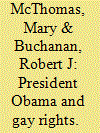

|
|
|
|
|
| Publication |
2012.
|
| Summary/Abstract |
We examine the role and potential impact of gay, lesbian, and bisexual (GLB) voters in the 2008 and 2012 presidential elections. We look at trend data from 1990 to 2010 to assess the fluctuations in support for the Democratic Party by GLB voters, specifically a substantial decrease in support during the 2010 midterm elections. We use data from the 2008 election to assess the estimated contribution the GLB vote made toward President Obama's margin of victory in key battleground states. Looking at the Obama administration's record on gay rights, specifically the failure to pass the Employment Non-Discrimination Act (ENDA), we argue that the Democratic Party could be held accountable in the 2012 election for their failure to provide protection from employment discrimination based on sexual orientation. Potentially the 2012 election will be closer than the 2008 race, highlighting the importance of the GLB vote to President Obama's reelection in key states. We argue that if President Obama incorporates strong support for ENDA into his reelection platform, the Democratic Party has the chance to recapture the GLB votes it lost in 2010 and maintain enough of the 2008 electoral votes that led to President Obama's victory.
|
|
|
|
|
|
|
|
|
|
|
|
|
|
|
|
| 14 |
ID:
117575


|
|
|
|
|
| Publication |
2012.
|
| Summary/Abstract |
It is fair to say that a great swath of forest was sacrificed for the study of negative campaigning. As we might hope and expect, a great deal has been learned since our initial assumptions that negative ads would be the downfall of our republic. (For an excellent review of this literature, see Geer 2006). This PS symposium and a spate of recent work (for example, see Herbst 2010; Shea and Fiorina 2012; Sobieraj and Berry 2011), suggest growing interest in a somewhat different form of negativity: the tone of political discourse, or what we might call levels of civility in politics. Much of this work has centered on the impact of nasty politics on individuals (Forgette and Morris 2006; Mutz 2007; Mutz and Reeves 2005; Fridkin and Kenney 2008). Might vitriol turn off citizens and lead to increased levels of distrust and cynicism?
|
|
|
|
|
|
|
|
|
|
|
|
|
|
|
|
| 15 |
ID:
117588


|
|
|
|
|
| Publication |
2012.
|
| Summary/Abstract |
As state capitals and city halls influence our daily lives, how can students become active participants in the affairs of their communities (Saffell and Basehart 2009)? For students to explore this question and local policy making in general, I developed a city council simulation for a state and local government course. This article describes the details of this city council simulation so that it can be easily replicated. Moreover, the goal is for students to move beyond classroom lectures and become more informed participants of local policy making.
|
|
|
|
|
|
|
|
|
|
|
|
|
|
|
|
| 16 |
ID:
117589


|
|
|
|
|
| Publication |
2012.
|
| Summary/Abstract |
The traditional format for teaching courses to undergraduate students has long been that of lecture when professors speak and students listen. However, as times have evolved so too have the pedagogical methods in the classroom. In teaching a course on diversity and discrimination in the society, this instructor opted to combine several teaching methods as a means of not only conveying the substantive material to the class but, more importantly, engaging the students at an interactive learning level. By combining traditional lecture with watching/discussing documentaries and incorporating structured student debate, a dynamic learning environment was created. As a result of incorporating the students into every aspect of the class, the students learned from both the instructor and students alike. Thus, the use of this multifaceted approach created a positive and engaging learning environment for the whole class.
|
|
|
|
|
|
|
|
|
|
|
|
|
|
|
|
| 17 |
ID:
117571
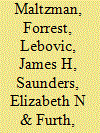

|
|
|
|
|
| Publication |
2012.
|
| Summary/Abstract |
In this article, we use a multimethod approach to shed light on the strategic use of presidential pets. We draw on primary source materials to demonstrate that pets are an important power center in the White House. Then we turn to presidents' strategic use of their pets in public. We present a theoretical framework and statistical evidence to explore the conditions under which presidents are most likely to trot out their four-legged friends. We show that presidents carefully gauge the best and worst times to conduct a dog and pony show. In times of war or scandal, dogs are welcome public companions, but not so in periods of economic hardship.
|
|
|
|
|
|
|
|
|
|
|
|
|
|
|
|
| 18 |
ID:
117587
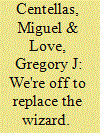

|
|
|
|
|
| Publication |
2012.
|
| Summary/Abstract |
This article examines the effectiveness of a collaborative group learning project for teaching a core competency in comparative politics: constitutional structures. We use a quasi-experimental design and propensity score matching to assess the value of a constitutional writing group project and presentation. The results provide strong evidence that these learning tools are highly valuable for teaching abstract concepts. Students who participated in the project scored significantly higher on a short series of questions in final exams given several weeks after the completion of the group project. Somewhat paradoxically, the project increased competency but did not affect student self-reported interest in the subject matter. The challenges and improvements that can be made for the use these types of learning tools concludes the article.
|
|
|
|
|
|
|
|
|
|
|
|
|
|
|
|
| 19 |
ID:
117574
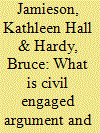

|
|
|
|
|
| Publication |
2012.
|
| Summary/Abstract |
To answer the question posed by the title of this article, we sketch what we mean by the concepts of civility and argument and engagement; note the ways in which the rise of partisan media menaces civil engaged argument; and close with analysis of an exchange between a prominent Democrat and Republican that illustrates the importance of common definitions and sources of trusted evidence.
|
|
|
|
|
|
|
|
|
|
|
|
|
|
|
|
|
|
|
|
|